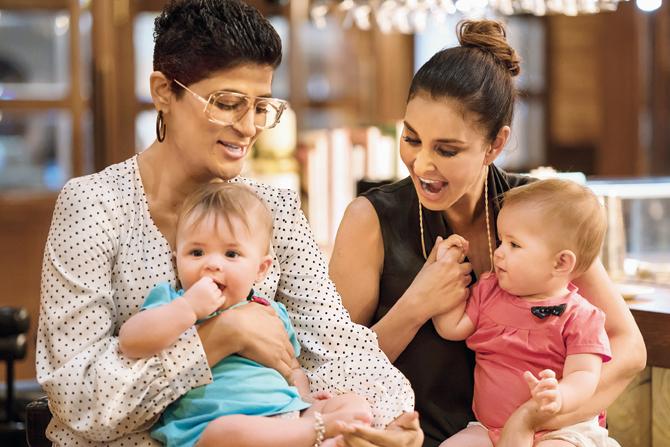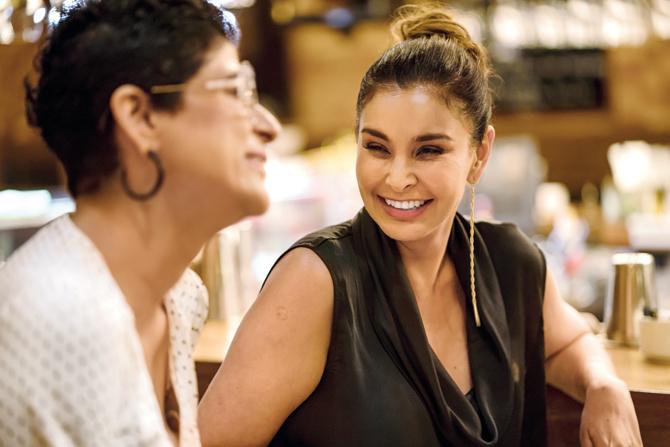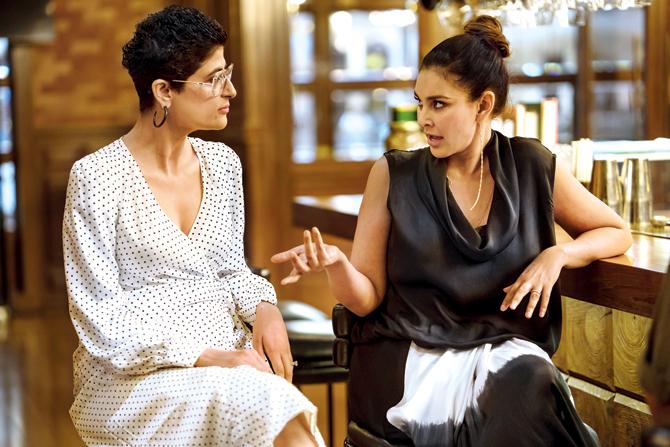Without #selflove, Lisa Ray and Tahira Kashyap say they wouldn't have survived cancer, found humour in bleak disease arithmetic or felt beautiful in radically altered bodies

Pics/Vikas Munipalle
A small suitcase plump with make-up sits behind a chair at Taj Lands' End's House of Nomad. The stylist follows our gaze, and says, "She doesn't need too much of it."
Lisa Ray is propped up on a high stool, speaking of being comfortable in her new skin. Tahira Kashyap, who has been listening to her, calls her hot in the way that a fan would. Ray cracks up, shaking her arm to prove she has bat wings. "Where? What!" Tahira goes, "She is so hot!"
Kashyap has enjoyed the preview excerpt she received of Ray's memoir, Close to the Bone. She has sent her a text message saying so, which Ray seems to have missed in a barrage of book promotion sessions. "Check your phone, right now!" Kashyap demands.
They stand shoulder to shoulder, peering into the phone screen; Ray in a black drape with a white streak of tie and dye, Kashyap in a white-black polka dotted wrap dress. They are twinning, without realising it. As they speak over milky tea ("I like a little bit of tea in my milk," says Ray), they discover other connections, including an affinity for practicing Buddhism and thumbing their nose at morbidly bad news.

Sufi and Soleil, Ray's children join them. LOCATION COURTESY/TAJ LANDS END COFFEE SHOP, HOUSE OF NOMAD
Ray has an interesting body of work behind her, including Deepa Mehta's Oscar nominee Water. Kashyap, who directed the well-received Toffee, a short film about unlikely friendships, is married to actor Ayushmann Khurrana, and is working on her second movie, to be produced by Atul Kasbekar and Tanuj Garg.
They talk a lot, and laugh more, admiring each other's resilience and commitment to trashing myths around women and cancer. Ray has survived multiple myeloma, a form of blood cancer, which she announced to the world at the red carpet of Toronto International Film Festival in 2009. Using her fame for cancer advocacy also extends to interviews around the memoir, just as Kashyap has leveraged her public image to document her recovery from ducta carcinoma in situ, since she was diagnosed last September.

mid-day: In the book, you say you asked the doctor if he'd like a glass of water when he revealed the diagnosis, and you didn't react.
Ray: He looked stressed at my reaction. Maybe he expected me to bawl.
Kashyap: My first reaction was funny. I had been feeling like my right breast was heavy, and had experienced a secretion. The gynaec asked for a mammogram and ultrasound, but the radiologist said, 'you have calcifications in your breast, but you are just 35 and have two kids. You don't need it'. He sent me back. The gynaec said it could be a mammary infection, and, to be sure, sent me to an expert who I didn't know was an oncologist. When I saw oncology written outside the department, I said, 'WTF!' Then, the doctor shared data with me.
Ray: Oh my god, statistics!
Kashyap: He said I had a two per cent chance of acquiring breast cancer. After the mammogram, they found more calcifications, and it went to 30 per cent. Then I went for an MRI, and they found a sort of shadow at the back of breast, and it became 70 per cent. It was 90 per cent after the biopsy. It was stage 0 cancer, but aggressive and had spread all over the breast.
There were so many people around me when I heard the news. We are conditioned not to react. But when my husband and I were back alone in the hotel room in Delhi, my first reaction was, "Behen****, lag kayi!" And we laughed.
But, when I was told I needed a mastectomy, I had no joke handy. Ayushmann made me realise, it's only remedial treatment. "What's more important, your life or breast?" I really wanted to say to him, 'my breast!' It's associated so strongly with femininity. But, as we went along, I realised my body doesn't define me. I got reconstruction surgery, of course, but my view of myself had changed.

Ray: It's funny what bothers you when you are diagnosed, the little things. I used to cope with it by laughing, and writing. But, what killed me was getting a port [disc and tube transplanted in the chest to connect to a major vein typically for chemotherapy and transfusions]. My veins were hard to find, so this helped. I still have it.
Kashyap: Hey, I had one too! Right here (points to right side of chest).
While I was on chemo, I attended a panel discussion where one woman said she had rejected drugs and was using some alternative Chinese herbs. I think that takes balls. My cancer was aggressive and malignant, so I am gald I took the drugs. But I realised that I had very little information and control over how my body worked. I still don't know whether it's good to eat one thing or another. I'm off dairy and gluten right now.
Ray: I got over with medication in 2010, and was on maintenance therapy. I wanted to go off drugs completely, but two years later, I had a relapse. I saw it as a sign, that I needed drugs and something else. Because in cancer, no one ever talks talk of nutrition. I went to a retreat in Florida that explores how nutrition can reverse disease. So, suddenly, you have an instruction manual for your body, like you would for a gadget. That was a big takeaway.
mid-day: How did the condition change your notion of beauty?
Ray: Just to be able to live is a win. I had always been deeply affected by the fact that I was defined by beauty. And so, I chose a moment on the red carpet to declare my fight against cancer. I was 40 pounds overweight due to steroids. I said, I am going to fight this, and that moment, broke the spell of the pathology of perfection. The images we see today on social media and in magazines don't exist. When I started modelling, there was no airbrushing pictures. I posted pictures of myself with no hair, and it didn't matter. Nothing matters when you are fighting for your life. I am happy now to be who I am, comfortable in this new skin (jiggles her arms and laughs).
Kashyap: You have so much to deal with physically that you try and win the fight mentally. People offered me so much love online, and their validation gave me energy. My parents had freaked out. When I went bald [she grew tired of wigs and decided to come out with a clean pate], my mother said she'd meet me when I had hair back on my head and cut the call. I called her back, this time on Facetime. There is no escaping me. I was resilient when it came to self love. I remember a time a few years ago when I'd be insecure because there were many gorgeous women around my husband all the time, and now I was posing bald on social. I was photographed bare-backed, the surgery cut snaking around. I genuinely felt cool. And my practice of Buddhist chanting helped. Strength suddenly
kicked in.
Ray: I practice Buddhism too! Tibetan Buddhism. I spent close to six months at a retreat in Dharamshala.
Kashyap: Really? It has helped me immensely. It's about being happy and I had made up my mind that I would be. I was a negative person three years ago, and I'm not sure how I would've dealt with this challenge back then. But Nichiren Buddhism made me stop being the victim.
Ray: My doctor said to my husband, who wanted to know more about the disease after we met, that life expectancy in multiple myeloma was eight years, according to statistics. He was worried. It meant I had four more years to go. This was in 2012. But I wouldn't believe anything they said. My practice had made me resilient. Everyone should find some sort of practice that resonates with them, and creates a cushion when needed.
mid-day: Lisa says she is wary of the "war imagery around cancer". But, for you, Tahira, hasn't it been effective in blunting a disease whose idea can kill before it actually does?
Ray: (Interjects) No, let me explain. Warrior, yes. That's an incredible imagery. I think that's really important...
Kashyap: Yes, it's not really a fight. It's more about awareness.
Ray: The problem with saying fight is that you are speaking of something outside your body. How can you fight against your own body? That's not the way forward in healing. The disease is inside you. For me, it was about accepting and building my immune system.
Kashyap: The fight is against taboo and stigma. A very close family member said to me, 'now that you've been diagnosed, don't speak about it'. I was told by the doctors that women who know about their cancer don't speak up or seek treatment due to shame. That's unacceptable. Then, there are those women who will agree to chemo, but not to a mastectomy. What I'm saying is, get your tests done, take caution. Do it for your kids.
mid-day: Lisa has often spoken about working towards reaching a space where she has strength and energy, which she owes the children. Where does motherhood feature in the fight against cancer?
Kashyap: I never felt something bad was happening to me or that I was going away anywhere, and so that mamta never kicked in! Yes, I was in the hospital for seven days, so I told my children that I was coming back with two stitches. But they had no clue. It hit my son when I went bald, and he asked me not to come in front of his friends. But I did to him what I did to my mother. I came in front of them and said, 'hello everyone!' I normalised my condition. The next time he seems someone
bald, he won't think it's embarrassing or weird.
mid-day: Have there been moments of loneliness?
Kashyap: We are all connected. We need a support system. People are very essential. I value every person I come in touch with now.
Ray: I'd add to that by saying there were so many instances of random kindness that I encountered. It was from people I didn't even know. And when I'd ask them, what can I do for you, they'd all say, pay it forward. I have tried to do that, make that the theme of my life.
Catch up on all the latest Mumbai news, crime news, current affairs, and also a complete guide on Mumbai from food to things to do and events across the city here. Also download the new mid-day Android and iOS apps to get latest updates
 Subscribe today by clicking the link and stay updated with the latest news!" Click here!
Subscribe today by clicking the link and stay updated with the latest news!" Click here!









